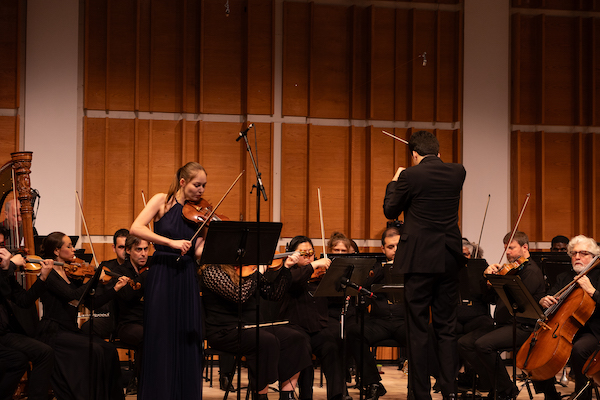Parlando explores musical melodrama in winningly eclectic fashion

Ian Niederhoffer provides a guide for what the audience should expect in terms of listening difficulty for the works performed at a Parlando concert. This rising young conductor might devise something similar in terms of rating the eclecticism for the programs that the chamber orchestra performs.
Certainly, Sunday afternoon’s varied and entertaining concert entitled “Melodrama,” would merit a top score of five chili peppers (or another symbol of choice).
As the conductor explained in his pre-concert remarks at Kaufmann Music Center’s Merkin Hall, the word melodrama is derived from the Greek “music drama”. In Great Britain, it became the name of a genre of theatrical entertainment combining music and drama, which developed as a result of laws restricting spoken theatrical performances to licensed theaters. It evolved into the most popular form of theatrical entertainment in nineteenth-century Britain.
Melodrama had a direct impact on silent movies and the composers that were inspired by them. That was the nexus which intrigued Niederhoffer and which he explored in this concert. And the natural starting point was Erich Korngold’s incidental music for Much Ado About Nothing, which he composed in 1920 for a German-language production of the Shakespeare play directed by Max Reinhardt in Vienna.
Korngold is known to movie buffs as the classical music composer who revolutionized film music. He came to Hollywood in 1934 at Reinhardt’s invitation to score the film adaptation of A Midsummer Night’s Dream (1935). Korngold would go onto win Academy Awards for Anthony Adverse (1936) and The Adventures of Robin Hood (1938) and composed the scores for a total of 16 films.
The five-movement suite which Korngold crafted out of the score was an immediate success. Niederhoffer led Parlando in a witty, colorful account of the original version for chamber orchestra. His buoyant reading of the rambunctious overture was enriched by the warmth of the string playing. Sweet melodies played by flute and harp added innocence and romance to “Maiden in the Bridal Chamber”.
March-like precision amplified the humor in “Dogberry and Verges,” while the “Intermezzo” with its melody first played by the solo cello was simply lovely. The horns blazed wonderfully in the concluding “Hornpipe,” which ended with a resounding wallop from the tympani.
The Finnish composer Kaija Saariaho, who died this past June, had the dual distinctions of being ranked the greatest living composer by BBC Music Magazine in 2019 and only the second woman to have an opera, L’Amour de loin, performed by the Metropolitan Opera in 2016. It has been written that “to journey into Saariaho’s music is to be confronted with the darkest and most dazzling dimensions of your subconscious.”
It was just such existential travels upon which Niederhoffer embarked with this performance of Saariaho’s Graal Théâtre. This violin concerto in all but name was inspired by the legends of King Arthur and the Knights of the Roundtable and their quest for the Holy Grail. The concerto is one of Saariaho’s few works without electronic sounds, but does contain all of her signature compositional techniques, including her unique harmonic structures and a sonic continuum extending from pure tone to unpitched noise.
The soloist was the superb violinist Geneva Lewis, who captured all of the haunting virtuosity of the piece with her exquisite playing. The sound of the violin is first heard amid the tinkling of bells, but far more complex and adventurous sounds were soon heard from both soloist and orchestra. Lewis’s integration of Saariaho’s bowing requirements, such as sul ponticello and sul tasto, into the fabric of the piece was as captivating as the her stratospheric flights into the musical unknown. This is cerebral, as well as deeply emotional music, which Niederhoffer conducted with authority, reverence, and affection.
The final work on the program was Darius Milhaud’s riotous Le Bœuf sur le toit. The prolific French composer was not only one of the most influential composers of the twentieth century, but equally important as a teacher. Composers as diverse as Burt Bacharach, Dave Brubeck, Philip Glass, Steve Reich, and Karlheinz Stockhausen studied with him.
Niederhoffer made the work’s link to melodrama explicit, as did its composer. Milhaud conceived Le Bœuf as incidental music for any one of the Charlie Chaplin silent comic movies. While Chaplin never took him up on the offer, Jean Cocteau later transformed it into a ballet.
The piece contains many of Milhaud’s exuberant stylistic touches including jazz, Brazilian music and polytonality. Niederhoffer said that the composer ran through all 12 major musical keys and even combined them all at once in the work. He also admitted to thinking that the tile translated to “Beef on a Roof,” rather than ox, as insisted upon by the composer, when he first discovered it as a student.
The jaunty opening theme is first heard in the trumpets and appears repeatedly throughout the piece, a boisterous showpiece for orchestra, with flashy solos sprinkled throughout the work. Niederhoffer led the players in a joyous celebration of melody and rhythm. The brilliant coda in which Milhaud unites all of its themes brought the audience to its feet.
Parlando returns to Merkin Hall on February 25 with “Transient Voices.” parlandonyc.com